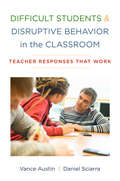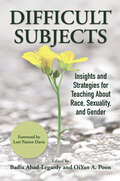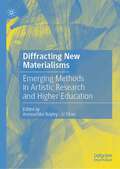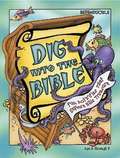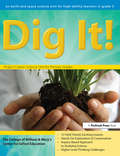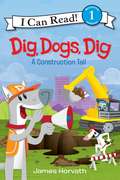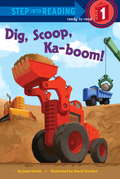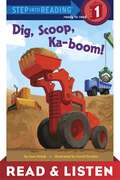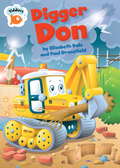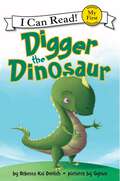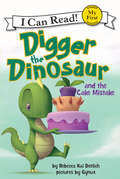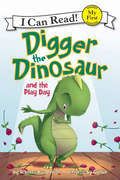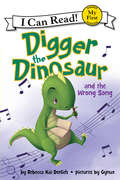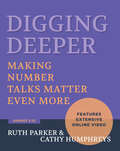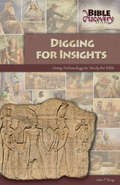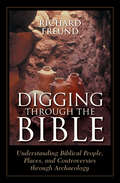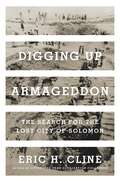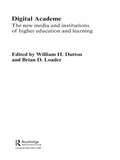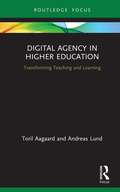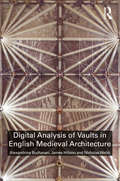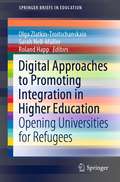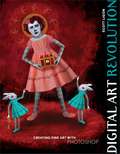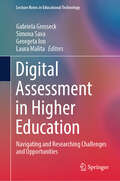- Table View
- List View
Difficult Students and Disruptive Behavior in the Classroom: Teacher Responses That Work
by Daniel Sciarra Vance AustinAttachment-based strategies for reaching and teaching disruptive, difficult, and emotionally challenged students. Difficult Students and Disruptive Behavior in the Classroom provides skills-based interventions for educators to address the most common problem behaviors encountered in the classroom. Offering not just problem-specific “best practices” but an attachment-based foundation of sound pedagogical principles and strategies for reaching and teaching disruptive, difficult, and emotionally challenged students, it empowers educators to act wisely when problem behaviors occur, improve their relationships with students, and teach with greater success and confidence.
Difficult Subjects: Insights and Strategies for Teaching About Race, Sexuality, and Gender
by Badia Ahad-Legardy OiYan A. PoonDifficult Subjects: Insights and Strategies for Teaching about Race, Sexuality and Gender is a collection of essays from scholars across disciplines, institutions, and ranks that offers diverse and multi-faceted approaches to teaching about subjects that prove both challenging and often uncomfortable for both the professor and the student. It encourages college educators to engage in forms of practice that do not pretend that teachers and students are unaffected by world events and incidents that highlight social inequalities. Readers will find the collected essays useful for identifying new approaches to taking on the “difficult subjects” of race, gender, and sexuality. The book will also serve as inspiration for academics who believe that their area of study does not allow for such pedagogical inquiries to also teach in ways that address difficult subjects. Contributors to this volume span a range of disciplines from criminal justice to gender studies to organic chemistry, and demonstrate the productive possibilities that can emerge in college classrooms when faculty consider “identity” as constitutive of rather than divorced from their academic disciplines.Discussions of race, gender, and sexuality are always hot-button issues in the college classroom, whether they emerge in response to a national event or tragedy or constitute the content of the class over a semester-long term. Even seasoned professors who specialize in these areas find it difficult to talk about identity politics in a room full of students. And many professors for whom issues of racial, and sexual identity is not a primary concern find it even more challenging to raise these issues with students. Offering reflections and practical guidance, the book accounts for a range of challenges facing college educators, and encourages faculty to teach with courage and conviction, especially when it feels as though the world around us is crashing down upon our students and ourselves.
Diffracting New Materialisms: Emerging Methods in Artistic Research and Higher Education
by Annouchka Bayley Jj ChanThis edited book considers the vital position of artistic research in the landscapes and ecosystems of new materialism(s) and post-humanism(s), in and for higher education. The book aims to satisfy an urgent desire for change in the ways we link artistic and critical research practices, asking what new ways of thinking and creating for twenty-first century artistic and educational contexts we need in order to address the kinds of global complexities we face. Organised around five key themes including fictioning, reading, embodying, inhabiting and folding, the book acts as an entry point for academics, artists and scholar-practitioners to participate in the shaping of new forms of artistic research and practice that are relevant, participatory, and that urgently address the kinds of complex issues emergent in our twenty-first century context. In doing so, the book makes a key contribution to the development of emerging inter- and transdisciplinary artistic research practices across a range of fields, responding to the question - what kinds of research and practice worlds do we wish to create in times of urgency, crisis and complexity?
Dig Into the Bible
by Daphna Lee FlegalContains reproducible pages of puzzles, dot-to-dots, word searches, and crosswords. These activities help teach Bible verses, Bible skills, and Bible messages. For use as arrival activities for Sunday school and other church classroom settings. Designed for ages 6-8 with basic reading and/or Bible skills.
Dig It!: An Earth and Space Science Unit for High-Ability Learners in Grade 3
by Clg Of William And Mary/Ctr Gift EdDig It!, a third-grade Earth and space science unit, encourages students to investigate humanity's effects on the environment and the importance of conserving natural resources. The unit builds upon students' prior knowledge and the overarching concept of change by providing opportunities to relate local examples of environmental pollution and conservation with hands-on scientific experiments and demonstrations.Dig It! was developed by the Center for Gifted Education at The College of William and Mary to offer advanced curriculum supported by years of research. The Center's materials have received national recognition from the United States Department of Education and the National Association for Gifted Children, and they are widely used both nationally and internationally.Each of the books in this series offers curriculum that focuses on advanced content and higher level processes. The science units contain simulations of real-world problems, and students experience the work of real science by using data-handling skills, analyzing information, and evaluating results. The mathematics units provide sophisticated ideas and concepts, challenging extensions, higher order thinking skills, and opportunities for student exploration based on interest. These materials are a must for any teacher seeking to challenge and engage learners and increase achievement.Grade 3
Dig, Dogs, Dig: A Construction Tail (I Can Read Level 1)
by James HorvathBeginning readers will love this I Can Read adventure starring a doggy construction crew, gently adapted from James Horvath’s popular picture book of the same title. Top dog Duke and his crew of construction-worker dogs are hard at work building a new park. They need lots of cool equipment to help them dig, haul, push, and plow—like a backhoe, dump truck, bulldozer, and grader. But what happens when the crew finds something unexpected buried deep in the ground?Dig, Dogs, Dig is a Level One I Can Read book, which means it’s perfect for children learning to sound out words and sentences.
Dig, Scoop, Ka-boom! (Step into Reading)
by Joan Holub David GordonA construction site crew is busy at work in this rhyming Step 1 story. As the work continues readers are in for a surprise--the "crew" is actually a group of young friends engaged in a fun day of dramatic play. Two sheets of vehicle-themed stickers are included. It's a natural for young readers who love to build and are fans of vehicles that dig, scoop, and sometimes go ka-boom!
Dig, Scoop, Ka-boom! Read & Listen Edition (Step into Reading)
by Joan HolubA construction site crew is busy at work in this rhyming Step 1 story. As the work continues readers are in for a surprise--the "crew" is actually a group of young friends engaged in a fun day of dramatic play. Two sheets of vehicle-themed stickers are included. It's a natural for young readers who love to build and are fans of vehicles that dig, scoop, and sometimes go ka-boom!This ebook contains Read & Listen audio narration.
Digger Don (Tiddlers #25)
by Elizabeth DaleDigger Don is struck by lightning! Then he just can't stop digging - when will he stop The Tiddlers series features fun stories with a word count of fewer than 50 words for children who are just starting to read.A word list at the beginning of the story allows for a quick check of the reader's ability to read and understand words before reading, and a puzzle at the end of the story encourages rereading for pleasure.
Digger the Dinosaur (My First I Can Read)
by Rebecca DotlichDigger the Dinosaur may be huge, but he has the heart of a preschooler. He loves to help but gets mixed up a lot. In Digger the Dinosaur, Digger wants to play baseball with his friends. But he isn’t allowed to go out until he’s cleaned his room. Digger starts cleaning at top speed, but the faster he moves the messier his room gets. His big tail and big feet aren’t helping! Will Digger win the race to tidy his room and get to the game on time? Gynux’s full-color illustrations capture Digger’s lovable personality. Digger the Dinosaur is a My First I Can Read book. That means it’s perfect for shared reading with a child.
Digger the Dinosaur and the Cake Mistake (My First I Can Read)
by Rebecca DotlichReaders will roar with laughter as Digger the Dinosaur mixes up silly phrases in his second fully illustrated I Can Read title.Today is the big dino party! Digger and Dadasaur take a ride into town to get a cake, but before long, they get lost. Can Momasaur help Digger before it’s too late? Or will Digger and Dadasaur have to go home cakeless?Beginning readers will learn common sight words and simple phonics sounds. Digger the Dinosaur and the Cake Mistake is a My First I Can Read book, which means it’s perfect for shared reading with a child.
Digger the Dinosaur and the Play Day (My First I Can Read)
by Rebecca DotlichDigger the Dinosaur is starring in a play! But will he remember all the lines he has to say? Young children just learning to read will enjoy the warmth and humor of this My First I Can Read story about a little dinosaur who keeps trying, no matter what.Author Rebecca Kai Dotlich is a poet and picture book author of such titles as What Is Science? and Lemonade Sun (an American Booksellers "Pick of the Lists"). Her work is featured widely in poetry anthologies and textbooks. My First I Can Read books are ideal for sharing with emergent readers.
Digger the Dinosaur and the Wrong Song (My First I Can Read)
by Rebecca DotlichIt's Stego's birthday and Digger knows the perfect present to give his best friend—a song! But when Digger mixes up the words, things get super silly.Join Digger the Dinosaur in all his I Can Read adventures!
Diggers Love to Go to School! (Where Do...Series)
by Brianna Caplan SayresLet your little one know that little trucks are just as excited to go to school as they are! This sturdy and delightful Diggers board book takes young readers on a fun filled journey through the first day of school, making it perfect for the youngest fans of the Where Do Diggers series and truck enthusiasts alike!Counting, patterns, taking turns...everything little diggers, monster trucks, and tractors love to do at school! These exciting activities will resonate with the littlest of readers who eagerly embrace each new day of learning and will help prepare those who are starting school for the first time. And they will love finding the mouse on every page!Children who can't get enough of trucks will love all the books in the bestselling Where Do Diggers... series. Look for these and more!Where Do Diggers Say I Love You?Diggers Love Their Mommies!Where Do Diggers Hunt for Easter Eggs?Where Do Diggers Trick or Treat?
Digging Deeper: Making Number Talks Matter Even More, Grades 3-10
by Cathy Humphreys Ruth ParkerMaking the transition to student-centered learning begins with finding ways to get students to share their thinking, something that can be particularly challenging for older learners. Authors Ruth Parker and Cathy Humphreys return with Digging Deeper: Making Number Talks Matter Even More, Grades 3-10, taking the readers into classrooms where their Number Talks routines are taught.In this comprehensive sequel to their best-selling book, Making Number Talks Matter, Parker and Humphreys apply their 15 minute lessons to older grade levels to inspire and initiate math talks. Through vignettes in the book, you'll meet other teachers learning how to listen closely to students and how to prompt them into figuring out solutions to problems. You will learn how to make on-the-spot decisions, continually advancing and deepening the conversation. Digging Deeper includes: Sample Problems: Digging Deeper is filled with a range of Number Talks problems, 10-15 minute warm-up routines that lend themselves to mental math and comparison of strategiesNavigating Rough Spots: Learn how to create a safe environment for tricky, problematic, or challenging student discussions that can arise when talking through problems and sharing ideasResponding to Mistakes: Ways to handle misconceptions and mathematical errors that come up during the course of Number Talk conversationsDigging Deeper is filled with teaching tips for using wait time between problems more efficiently, honoring student contributions while still correcting errors, and teaching concepts while nudging independent thinking. Through daily practice and open conversation, you can make Number Talks matter more.
Digging For Insights: Using Archaeology to Study the Bible (Bible Discovery Series)
by John F BrugAre there archaeological proofs of the Bible? What is biblical archaeology?Archaeology is an incredible tool for learning about past civilizations, including the peoples and cultures of Biblical times!Author John F. Brug has his Ph.D. in ancient Semitic languages and archaeology and uses that knowledge in this insightful book. Digging for Insights demonstrates how archaeology contributes to a greater understanding of God’s Word and the truths it contains. It also provides a framework for evaluating the claims, interpretations, and speculations of modern science.This book will help you dig deeper into God’s Word and discover its riches in your life today!This book is part of the Bible Discovery Series, which provides you with background resources to help you unearth and understand the Bible’s greater meaning for you.
Digging Through the Bible: Understanding Biblical People, Places, and Controversies through Archaeology
by Richard A FreundA &“masterful and eminently readable&” journey through the fascinating insights and revelations of Biblical archeology (Publishers Weekly, starred review). Many of our religious beliefs are based on faith alone, but archaeology gives us the opportunity to find evidence about what really happened in the distant past—evidence that can have a dramatic impact on what and how we believe. In Digging Through the Bible, archaeologist and rabbi Richard Freund takes readers through digs he has led in the Holy Land, searching for evidence about key biblical characters and events. Digging Through the Bible presents overviews of the evidence surrounding figures such as Moses, Kings David and Solomon, and Mary the mother of Jesus, as well as new information that can help us more fully understand the life and times in which these people would have lived. Freund also presents new evidence about finding the grave of the Teacher of Righteousness mentioned in the Dead Sea Scrolls, and gives a compelling argument about how the Exodus of the Israelites may have taken place in three separate waves over time, rather than in a single event as presented in the Bible.
Digging Up Armageddon: The Search for the Lost City of Solomon
by Eric H. ClineA vivid portrait of the early years of biblical archaeology from the acclaimed author of 1177 B.C.: The Year Civilization CollapsedIn 1925, James Henry Breasted, famed Egyptologist and director of the Oriental Institute at the University of Chicago, sent a team of archaeologists to the Holy Land to excavate the ancient site of Megiddo—Armageddon in the New Testament—which the Bible says was fortified by King Solomon. Their excavations made headlines around the world and shed light on one of the most legendary cities of biblical times, yet little has been written about what happened behind the scenes. Digging Up Armageddon brings to life one of the most important archaeological expeditions ever undertaken, describing the site and what was found there, including discoveries of gold and ivory, and providing an up-close look at the internal workings of a dig in the early years of biblical archaeology.The Chicago team left behind a trove of writings and correspondence spanning more than three decades, from letters and cablegrams to cards, notes, and diaries. Eric Cline draws on these materials to paint a compelling portrait of a bygone age of archaeology. He masterfully sets the expedition against the backdrop of the Great Depression in America and the growing troubles and tensions in British Mandate Palestine. He gives readers an insider's perspective on the debates over what was uncovered at Megiddo, the infighting that roiled the expedition, and the stunning discoveries that transformed our understanding of the ancient world.Digging Up Armageddon is the enthralling story of an archaeological site in the interwar years and its remarkable place at the crossroads of history.
Digging up the Past (Into Reading, Level V #49)
by Adam Ford Laura SuaNIMAC-sourced textbook. Did you know that some people travel around the world digging things out of the ground for a living? Archaeologist Adam Ford explains exactly what his job involves. Read about the types of places an archaeologist can work in and the sorts of things they find. And find out what makes an ordinary house turn into a ruin over many years.
Digital Academe: New Media in Higher Education and Learning
by Brian D. Loader William H. DuttonThis book responds to an ever-increasing call from educators, policy makers, journalists, parents and the public at large for analysis that cuts through the hype surrounding the information revolution to address key issues associated with new media in higher education and learning. This collection is of value to those who are seeking a critical, non-commercial exposition of both the enormous opportunities and challenges for higher education that are tied to the use of new information and communication technologies (ICTs) in the development of distance education and distributed learning.The chapters are written by leading exponents, practitioners and researchers from a variety of disciplinary perspectives and the collection as a whole spans national boundaries and reaches beyond the research community to relate to issues of policy and practice.
Digital Agency in Higher Education: Transforming Teaching and Learning
by Toril Aagaard Andreas LundExploring how digital resources are being used to engage students in learning and improve educational quality, Digital Agency in Higher Education promotes an awareness of relations and interplay between humans and digital artifacts.Examining the impacts in higher education through experience-based knowledge and a conceptual framework, this book:• provides a detailed analysis of how transformative agency can be identified, enacted, and cultivated, • offers up-to-date cases and a future-orientated perspective on technology and knowledge work,• addresses fundamental assumptions about how teacher education has needed to and needs to continue to develop, • explores issues of epistemology and ethics when facing increasingly ‘intelligent' technologies, and• argues for transformative agency to place a firm focus on human interests.Essential reading for teachers in higher education and educational researchers with an interest in how technologies impact learning and teaching, Digital Agency in Higher Education uses cutting-edge research to bridge the gap between theoretical perspectives and practices.
Digital Analysis of Vaults in English Medieval Architecture
by Nicholas Webb Alexandrina Buchanan James HillsonMedieval churches are one of the most remarkable creative and technical achievements in architectural history. The complex vaults spanning their vast interiors have fascinated both visitors and worshippers alike for over 900 years, prompting many to ask: ‘How did they do that?’ Yet very few original texts or drawings survive to explain the processes behind their design or construction. This book presents a ground-breaking new approach for analysing medieval vaulting using advanced digital technologies. Focusing on the intricately patterned rib vaulting of thirteenth and fourteenth century England, the authors re-examine a series of key sites within the history of Romanesque and Gothic Architecture, using extensive digital surveys to examine the geometries of the vaults and provide new insights into the design and construction practices of medieval masons. From the simple surfaces of eleventh-century groin vaults to the gravity-defying pendant vaults of the sixteenth century, they explore a wide range of questions including: How were medieval vaults conceived and constructed? How were ideas transferred between sites? What factors led to innovations? How can digital methods be used to enhance our understanding of medieval architectural design? Featuring over 200 high quality illustrations that bring the material and the methods used to life, Digital Analysis of Vaults in English Medieval Architecture is ideal reading for students, researchers and anyone with an interest in medieval architecture, construction history, architectural history and design, medieval geometry or digital heritage.
Digital Approaches to Promoting Integration in Higher Education: Opening Universities for Refugees (SpringerBriefs in Education)
by Olga Zlatkin-Troitschanskaia Sarah Nell-Müller Roland HappThis book discusses digital learning opportunities in higher education for refugees with different educational, social, cultural and linguistic backgrounds. Based on findings from practical studies and research projects from several countries, the book highlights the numerous challenges when it comes to the successful integration of refugees into higher education. These challenges arise at both the individual and the institutional level. The contributions included in this book show how these challenges can be effectively met using digital teaching-learning platforms. The work thus offers a comprehensive insight into the opportunities online-based learning platforms offer regarding the successful integration of refugees into higher education Overall, the research presented in this volume is relevant for political stakeholders, university practitioners in the field of migration research, university research, and online and digital learning.
Digital Art Revolution
by Scott LigonThere's no question that applications like Photoshop have changed the art world forever. Master digital artists already use these tools to create masterpieces that stretch the limits of the imagination--but you don't have to be a master to create your own digital art. Whether you're a beginner who's never picked up a pen or paintbrush, or a traditional artist who wants to explore everything a digital canvas might inspire, digital artist and arts educator Scott Ligon guides you and inspires you with clear instructions and exercises that explore all the visual and technical possibilities.Featuring the work of 40 of the finest digital artists working today, Digital Art Revolution is your primary resource for creating amazing artwork using your computer.From the Trade Paperback edition.
Digital Assessment in Higher Education: Navigating and Researching Challenges and Opportunities (Lecture Notes in Educational Technology)
by Gabriela Grosseck Simona Sava Georgeta Ion Laura MalitaThis book offers a comprehensive exploration of digital assessment (DA) in higher education, with a focus on navigating the challenges and opportunities brought on by the digital age. By drawing on research-based evidence and theoretical approaches, it offers valuable insights, guidance, and examples for navigating the complexities of DA in higher education. It addresses key topics and issues facing educators and Higher Education Institutions (HEIs) in the design, implementation, and evaluation of DA strategies, while also recognizing the importance of the DA competencies of academic staff. This book is a useful reference for educators, researchers, managers of HEIs, and policymakers who are looking to enhance digital assessment practices, develop their own competencies for digital assessments, and stay at the forefront of educational innovation.
